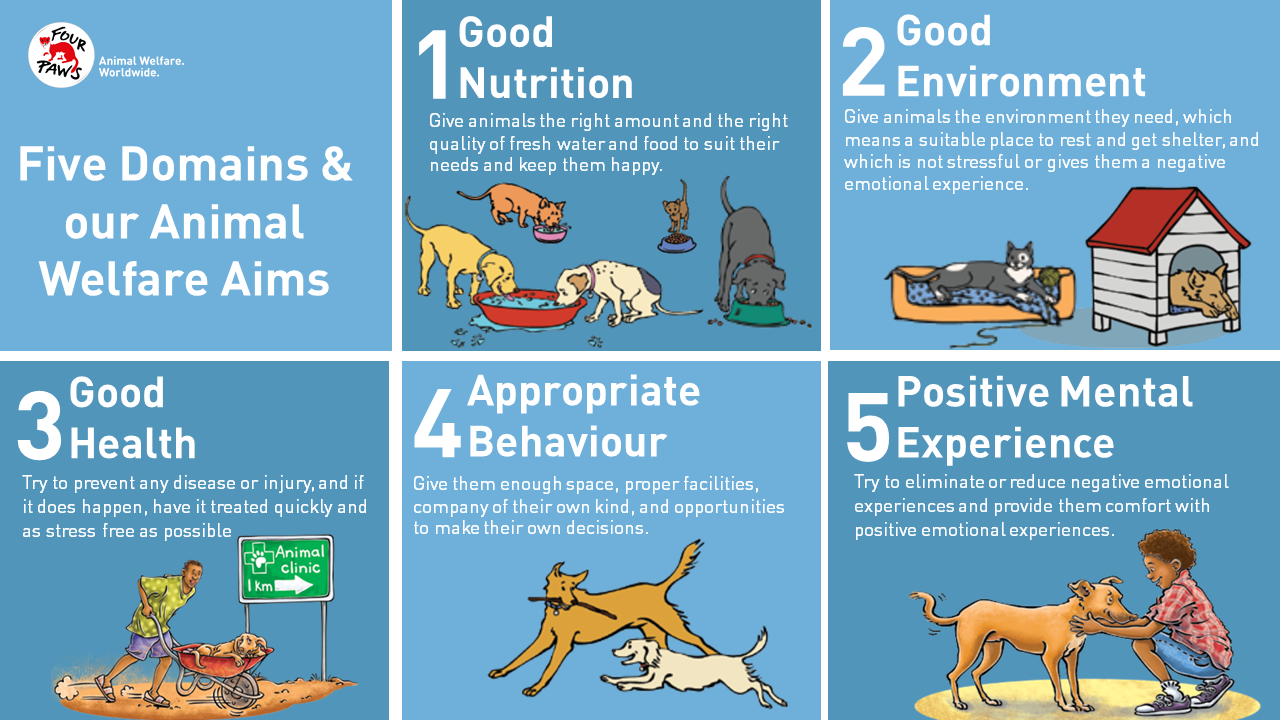
The ‘Five Domains’ Model in EU Animal Welfare Legislation
Moving from the 'Five Freedoms' model to the 'Five Domains' as an animal welfare assessment framework in EU legislation
Animal welfare is an individual and subjective mental state. It is the sum of all mental experiences of an individual at a given time. This mental state is influenced by the interplay between the functional domains of an animal's life, namely: the quality of its nutrition, the physical environment it lives in, its health status, and its behavioural interactions within its physical and social context. Together, these domains will determine the overall health and welfare of the animal under human control.
Having an animal welfare assessment framework is essential in order to recognise signs of pain, suffering and distress, and to be able to improve the practical care of animals. In order to comprehensively assess the welfare state of an animal under human care, it is important to evaluate the impact of human presence and behaviour on the animal. Handling, training, medical treatments, and caring for an animal are situations where the interaction between humans and animals can lead to either negative or positive mental experiences. Today, there are two animal welfare assessment tools: the 'Five Freedoms' and 'Five Domains' models.

Five Domains schematic
Five Freedoms vs Five Domains
The well-known ‘Five Freedoms’ concept was developed by the UK Farm Animal Welfare Council in the 1965 to describe society’s expectations for the conditions animals should experience when under human control. This materialised into five essential freedoms:
- Freedom from hunger and thirst
- Freedom from pain, injury and disease
- Freedom from distress
- Freedom from discomfort
- Freedom to express behaviours that promote well-being
But since the 1990s, science has greatly improved our knowledge of the unpleasant and pleasant mental experiences animals can have and how they affect their welfare. For instance, we now know that animals are able to have positive experiences (e.g. pleasurable tastes whilst eating, physical comfort, enjoyable companionship, excited playfulness), which significantly enhance their quality of life. The ‘Five Freedoms’ model is nowadays an inadequate tool for assessing animal welfare as it does not refer to positive experiences and it refers to only a small proportion of the mental experiences an animal can have.
The ‘Five Domains’, on the other hand, was developed in 1994 by Professor David Mellor and Dr. Cam Reid as a framework that allows for a distinction to be made between the physical factors that affect an animal’s welfare and the overall mental state of the animal arising from these factors. So, while the model uses the same five elements as the ‘Five Freedoms’, the ‘Five Domains’ explores the mental state of an animal in more detail and considers the emotional needs to be equally important as physical needs. FOUR PAWS has been using the Five Domains Model as a tool for guiding animal welfare assessments.
Below is a table, adapted from Mellor 20164 and Mellor et al. 20205, detailing five General Welfare Aims, supported in each case by several Focusing Welfare Targets. The listed Provisions are directed at securing the corresponding Aims and Targets. On the one hand, these welfare aims and targets seek to practically minimise the occurrence of negative internal states and external situations, and the negative experiences associated with them. On the other hand, a strong emphasis is placed on promoting positive experiences.
| General Welfare Aims | Focusing Welfare Targets | Provisions |
| Good Nutrition | To minimise thirst and hunger and enable eating to be a pleasurable experience. | By providing ready access to fresh water and a species-appropriate diet to maintain full health and vigour[a]. |
| Good Physical Environment | To minimise discomfort and exposure to adverse environmental conditions and to promote physical comfort. | By providing appropriate outdoor access and suitable shelter against adverse weather conditions[b], and/or housing with different functional areas[c], comfortable resting areas, and good air quality. |
| Good Health | To minimise pain[d], disease, and other discomforts and to promote the pleasures of vigour, strength, robustness and harmonious physical activity. | By preventing or rapidly diagnosing and treating diseases and injuries, and by stimulating, among others, proper muscle tone, natural body posture, cardiorespiratory function, and digestive system processes. |
| Appropriate Behavioural Interactions | To minimise threats and unpleasant restrictions on behaviour and movement, and to promote engagement in rewarding activities. | By providing sufficient space, conspecific company[e], human interactions that are adapted to the individual needs and appropriately varied conditions[f] to allow for species-specific behavioural expression |
| Positive mental experiences | To promote the experience of various forms of comfort, pleasure, interest, confidence and a sense of control. | By providing safe and species-appropriate environmental, conspecific and human interactive opportunities to have pleasurable experiences. |

The 'Five Domains' elements applied to the care of companion animals.
How does this fit in the new EU Animal Welfare legislation?
The upcoming EU animal welfare legislation presents a crucial opportunity to reshape our approach to animal welfare standards. While the 'Five Freedoms' model has long been a benchmark in this field, it is essential to consider adopting the 'Five Domains model' as the basis for the new legislation. The model offers a more comprehensive and holistic framework for evaluating animal welfare. By embracing this model, the EU can establish progressive standards that prioritize the overall welfare of animals and align with evolving scientific understanding.
By incorporating the ‘Five Domains’ model within the Kept Animals Proposal, the new minimum standards for farm and companion animals would take into account the positive experiences and emotions of animals, such as the need for positive engagement, mental stimulation, and the expression of natural behaviors, rather than just the absence of physical pain. This shift in perspective acknowledges that animal welfare is not solely about minimizing suffering but also about promoting positive well-being.
Author: Morgane Speeckaert
